- Home
- Jeff Mariotte
Serpents in the Garden Page 7
Serpents in the Garden Read online
Page 7
They looked up to him. Every Victor did. And in their own way, the laborers did as well. They knew who their ruler was, at any rate. Apella was the governor of Victory, and Victory held sway over all the people of the flatlands.
But it wasn’t enough. Krell had promised him domination over all of Neural. The Klingon had hinted that there were distant lands, far out of sight, where people dwelled who had never heard of Victory, much less Apella.
The fact that he ruled meant that he was supposed to rule. Krell had explained that about himself, and about the Klingon presence on Neural, and Apella had extrapolated it to himself and his situation. He deserved power. He had earned it, taken it, amassed it by force of will and personality and by throwing in his lot with the strongest of the strong. Now, he wanted more. He wanted it all. Not for his own aggrandizement, of course, but for what he could do for his people and for all the people of Neural. Theirs was a poor world, backward compared to the advanced civilization of the Klingons. They needed the wealth that Klingons could help bring. They needed the technological advantages the aliens offered, and when they had those things they would be equal partners in the Klingon Empire.
Apella’s destiny was to help Neural achieve its destiny. He knew, with every bit of confidence imaginable, that he would be the vehicle, the catalyst, that could drive Neural from its stunted, primitive state into the magnificent future it was meant to have.
If he could capture this man Kirk, if he could prove himself a “friend to the Klingon Empire,” that might be enough. With the might of the empire at his back, all of Neural would bow before him, and he would have the power he needed to drag his world toward its rightful tomorrow.
This man Kirk had been close by, and not that long ago. Apella needed his best trackers, and he needed them now. He relinquished his beloved view, and went to gather them together.
Nine
“I’ve had all I can stand,” Scott said. “And then some! I’m supposed to get this tub worthy of the name Enterprise, but I’m blocked every way I turn.”
“What is it now, Scotty?” Uhura asked. He had found her and Chekov in the mess, comparing notes over a late lunch.
“It’s Command! I need a wide spectrum capacitor lock—a wee thing, really, but I can’t guarantee performance above warp six without it. But because the overhaul I’m proposin’ is considered experimental, they don’t want to provide the part until the Corps had a chance to do their tests.”
“There must be something you can do,” Chekov offered. “Some way to cut through the static.”
“There had better be,” Scott replied. “Or I’ll just retire and let the button-pushers figure out how to run a starship. I’m thinkin’ I’ll pay a visit to Admiral Kirk. If anybody knows how to work the system, it’ll be him.”
“Good idea,” Uhura said. “You’re right, he’s always known how to get things done.”
“Tell him hello for me,” Chekov said. “Do you think he’s enjoying desk duty?”
Scott raised an eyebrow. “Have you met the man?”
Chekov chuckled, and Uhura joined in. “I didn’t say I expected him to. That doesn’t mean I cannot hope to be surprised.”
* * *
After a quick meal, Scott went into Starfleet Command’s headquarters. He always felt a little uncomfortable there, amid the busy bustle of bureaucrats. Most of them didn’t speak his language, even if they had served among the stars. And he didn’t speak theirs. He understood many of the words, and the topics of conversation tended to revolve around sending starships into space, which was a subject he could discuss at great length. But his concerns were the actual, physical requirements of space travel—how did one balance the conflicting needs of cargo, personnel requirements, and engine power? What kind of gearing mechanism was required to make the doors iris open smoothly in zero gravity and in full artificial gravity? The concerns of those at Command were logistics, strategies, and politics, and sometimes the deeper philosophical questions pertaining to the whys and wheres. Scott was all about the hows.
But one didn’t reach his position in Starfleet without learning how to work the system. He pasted on a smile and entered the headquarters building. He nodded to those he saw—those who acknowledged his presence, at any rate—spoke a few friendly, noncommittal words when he had to, and made his way to the admiral’s office.
The door was open, but the lights were off. Scott walked in, expecting to find Kirk’s flag aide, Rowland, even if the admiral himself was off at one of the endless meetings he sometimes complained about. The lights blinked on when he entered, but Rowland’s desk was vacant. Same with Kirk’s.
On his way out of the office, Scott was almost mowed down by a female ensign carrying an armload of data slates. His sudden appearance startled her, and her arms flew into the air, scattering the slates everywhere.
“Och, I’m sorry, lass,” he said, dropping to his knees to help gather them up.
“You should really watch where you’re going, sir,” she said.
“I’m not the one who was barrelin’ down the hall like I’d been shot from a torpedo tube.”
“I didn’t expect anyone to be coming out of an office I know is empty,” she argued. “And—” She stared at him for a long moment, slates beginning to slip once more from her grasp. “You’re Montgomery Scott!”
“That I am.”
She let the last of the slates crash to the floor and stuck out her hand. “It’s an honor to meet you, sir,” she said. “I’m Belinda Fairweather.”
Scott racked his memory to determine whether the name was supposed to mean anything to him, other than sounding like someone who might live next door to Rebecca of Sunnybrook Farm. He couldn’t come up with anything. “It’s my pleasure, Ensign Fairweather.”
“Admiral Kirk talks about you all the time.”
“Speaking of the admiral, d’you know when he’ll be back?”
Her eyes were green and wide, her hair was brown and long but piled and pinned atop her head, and when he asked his question, her mouth made an O shape until she bit down on her lower lip. “I can’t say.”
“Well, where is he?”
“I can’t say.”
“Who can say?”
“I can’t say that either. I’m sorry, Commander Scott. So sorry. I’ve probably said too much already.”
Scott scooped up a couple of handfuls of her slates and thrust them at her, then regained his feet. “Well, somebody’s got to know something and be able to talk about it. He’s a rear admiral in Starfleet; he can’t just vanish into thin air.”
“Well, he sort of can.”
“I’m not following you, Ensign Fairweather.”
“I’ve said too much.”
“If you won’t tell me where he is, I’ll find somebody who can. Good day, Ensign.”
She clutched the slates, losing her grasp on half of them again—a fact that might have disturbed Scott more had she not annoyed him so—and grabbed his arm with her free hand. “Commander,” she said. “I—”
“Let me guess. You’ve said too much already.”
“Yes, I have. But what I was going to say was, I know he’s a friend of yours. I can’t tell you where he is or when he’ll be back—I don’t know those things myself. But if you’d like, I can pass the word up to Admiral Kucera that you’re looking for him, that you’d like to know. I don’t know that it’ll do any good, but I can try.”
“Are you saying he’s on some kind of secret mission?”
“I’m saying I don’t know where he is.”
“Who does?”
“I can’t say, sir.”
Scott started to snap at her, then caught himself, his right index finger pointing across the short distance between them. “You—you are good, I’ll give you that, Ensign. All right, yes. Send the word up. Tell ’em I want to know and—”
“As soon as possible.”
“Ensign Fairweather?”
“Yes, Commander?”
“I�
�m glad I ran into you today. Not literally. But otherwise.”
“As am I, Commander Scott,” she said.
He left her with her slates, wondering what the admiral could possibly be up to, and why anyone would need to carry so many data slates around.
* * *
A light rain fell during the early afternoon, cooling them as they hiked back toward Freehold and washing away the industrial stink Kirk had been afraid would cling to him. By the time they reached the walled settlement, the sun had reappeared and dried them off. The trail was muddy in spots, coating their boots until they kicked or stomped it loose. Enjara exulted in the rain, declaring it a gift that would help feed every mouth in Freehold.
Upon their return, Kirk found out firsthand what he meant. A group of Freeholders was preparing to go out to Providence Valley, an area of cultivated fields far beyond the walls, to harvest fruits and vegetables ready for the picking. Tyree encouraged Kirk to go along, and Kirk agreed. Recognizing that his people might be tired from the long hike down into the valley and back, he offered them the chance to stay behind.
“Not a chance, Admiral,” Rowland said. “I wouldn’t miss it. There’s nothin’ like an apple fresh from the tree.”
“I’m not sure there’ll be any apples,” Kirk said. They’d had an assortment of the local produce at the feast the night before, and more on the trail today, and while he was willing to proclaim it “interesting,” so far none of it had been comparable, in Kirk’s mind, to what he was familiar with at home. “But if you liked the regalu we had last night,” he continued, naming a red, leafy vegetable that had tasted something like a cross between beets and cauliflower dowsed in vinegar, “then you’re probably in luck.”
“The regalu was okay,” Hay said. “I liked the confolli better, though. That was tasty stuff.”
“It sure was,” Burch seconded. Kirk nodded. Confolli was a spiny fruit, not quite as prickly as cactus, but with a sweet, juicy pulp underneath the forbidding skin. Eating it was an exercise in patience, because to rush it might mean a spine through the tongue or cheek. But taking the time to separate the skin from the inside was worth the effort.
“We’ll all go, sir,” Burch said.
“Fine,” Kirk said. “We can rest later, after the harvest. Fair warning, though—they’ll probably put us to work.”
“No problem,” Hay said. “I’ve picked produce before. That way you get first crack at the good stuff.”
Soon they were leaving the walls behind again, this time heading deeper into the hills, in a direction Kirk had never been. Everyone carried a large basket, which they would be expected to fill. There were about twenty of them, and they stretched out in single file, following a trail that wound through wooded sections and climbed narrow hillside paths.
The high valley was lush and green, with a slow-moving river drifting through it in a series of sweeping curves. Cultivated fields and orchards were laid out in neat rows, crisscrossed by irrigation ditches fed by the river. Tall trees fringed the edges of the fields and marched toward hills on the valley’s far side. Massive flocks of birds moved about, their iridescent feathers sparkling in the sunlight.
“It’s beautiful,” Kirk said, pausing at the peak of the trail leading down the hill and into the valley. He hadn’t been speaking to anyone in particular, but a female voice answered him.
“Yes, it is. I love Freehold, but I love this place more.”
Kirk looked at the speaker. Meena, the woman he had met at the previous night’s celebration, stood behind him with her basket resting against a cocked hip and a flintlock across her back, its strap cutting between her breasts. His adjective described her as well as the valley, he realized. Her beauty was more subtle than that of Tyree’s sister, Elanna, or Tyree’s late wife, Nona, but was perhaps more penetrating for that understatement. Kirk had to look at her a couple of times to see it, but once he had, he couldn’t look away. “You’re fortunate,” he said, “that you get to come here. Do the Victors know about it?”
“They do,” she said. “They have raided it a few times, but in the end, they have taken no steps to destroy it. I believe they ignore it because they know it feeds us and makes us strong, which suits their ends when they put us to work.”
The people in line behind them were catching up, so Kirk and Meena started down the final slope, side by side, their baskets occasionally colliding. When they reached the fields, they remained close together, Meena showing Kirk how to use a knife to cut the confolli fruits from the barbed thickets of the waist-high bushes they grew on, and occasionally sharing other harvesting tricks. Within an hour, his basket had started to grow heavy.
And he liked it, he realized. He liked Meena, who kept him laughing with her stories of Freehold life, and he liked working under the sun, sweating from honest labor, with dirt under his fingernails and a pleasant soreness developing in his neck and shoulders. It was the furthest task possible from captaining a starship, but he couldn’t deny the visceral pleasure he drew from it. He wasn’t the only one, either; despite constant anxiety over the Victors, he heard more jokes than complaints, and he saw smiling faces and healthy, hardworking people.
Kirk had been angling so hard for a way to get back into space, he hadn’t stopped to wonder if that was really what he wanted. At this moment, he wasn’t sure. Maybe what he wanted was a break from the responsibility of carrying all those lives on his shoulders, of making every hard decision. Maybe his shoulders were better suited, at this stage of his life, for picking fruit and carrying baskets. Laughing in the sun wasn’t a bad way to spend a day, or a year, or a lifetime.
* * *
Nyran filled his baskets with fuferan pods, working diligently to select only the ripe ones. He hated the bitter, stringy insides, no matter how they were prepared, but they were one of his mother’s favorite vegetables, and she would be upset if he brought home anything less than the best.
As he worked, though, he made his way toward the field’s distant edge. At one point he set his basket down, wincing, his ribs still aching from the beating he’d taken the night before. He touched his left cheekbone, bruised and raw. Joslen had raged against her townsfolk, had pummeled them with fists and feet, and Nyran had fought back as hard as he could. But they were three, all bigger and stronger than he, and just intoxicated enough that even his best shots didn’t seem to hurt them. He hoped that today, they were at least feeling residual pain from the brawl, because his pains were more than residual, they were all-encompassing. And they were more than just physical—they hurt from the inside out.
He thought about a day, years before, when his mother had taken him aside to tell him a story. “Selanee was the first hero,” his mother had said. He had seen only thirteen summers at the time, had not even earned his forehead gem yet, though he had it now. He would always remember that year, because it was the year his father had died, murdered by Villagers. He’d heard the story of Selanee many times throughout his childhood, but she had never before told it in just this way.
“Our people lived in great danger, in those days. Everyone lived in the valleys, close to the rivers, because that was where the fields were rich and fertile and where there was always game to be hunted. But there were terrible beasts in the valleys, as well. They roamed about freely, and whenever they found people, they attacked. No one was safe.
“Selanee was born the third son of a third daughter. The night he was born, a ferocious storm was sweeping through the valley where the people lived. It rained for three days and three nights, and the river rose until it was beginning to overflow its banks. The people knew that if it did, their fields would be flooded and their homes would be lost. On that third night, Selanee was born. As soon as he came into the world, he gave a loud wail, and as if at his signal, the rain stopped. The river receded and the homes were saved.
“That was the first time people realized what a hero he would become. I have told you other stories, of young Selanee and the magong, of Selanee fighting of
f the fish-men, yes?”
“Yes, mother,” Nyran had replied. “But I like hearing them.”
They sat out of the day’s sunshine, in the shade offered by their lean-to. The life of the settlement went on around them: people skinned and tanned the hides of animals that hunters had brought them, others prepared meals of fresh vegetables and fruit. From the nearby stream came the joyful sounds of those bathing and washing the skins they wore.
But in his mother’s eyes, in the slump of her shoulders, and in the desultory tone of voice with which she spoke, Nyran knew that sadness weighed heavily upon her.
“The year Selanee reached sixteen summers,” she went on—just the age he was now, he realized, though at the time it had seemed impossibly far away, “the valley suffered one catastrophe after another. First the rains did not come in spring or summer, causing the crops to wither and die. Mugatos and other beasts raided often, killing many. Fire came and burned the homes of the people, killing more.
“In the middle of it all, Selanee vanished. He went up into the hills and explored, and then he came back to the valley and bade all the people follow him. The people did. Selanee led them high into the hills, climbing and climbing and climbing, until they found places to settle where it was safe and cool and the streams flowed freely and there were lush valleys in which to plant crops. Selanee kept climbing, until he grew wings, and then he took flight and watched over the people always, for the rest of time. And thus were born the Hill People.
“Selanee’s bravery will always be remembered,” she said. Then Nyran noticed that her voice caught in her throat, and her eyes glistened. “Just as . . . just as your father’s courage will always be remembered. Selanee showed us what is best in us, and your . . . your father showed us again. And you, Nyran, you have the stuff of heroes in you, too.”

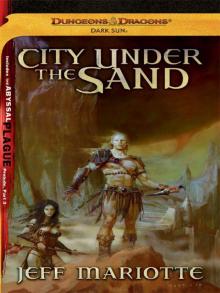 City Under the Sand
City Under the Sand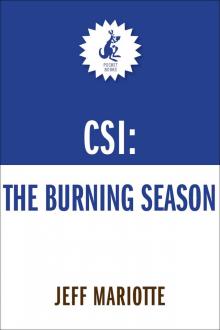 The Burning Season
The Burning Season Sanctuary
Sanctuary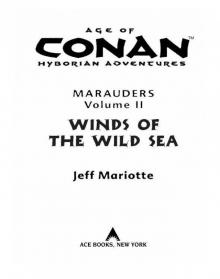 Winds of the Wild Sea
Winds of the Wild Sea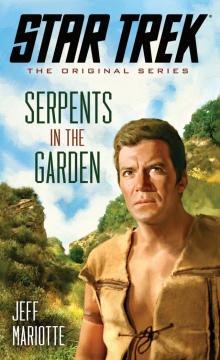 Serpents in the Garden
Serpents in the Garden Close to the Ground
Close to the Ground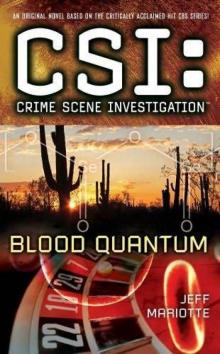 Blood Quantum
Blood Quantum Brass in Pocket
Brass in Pocket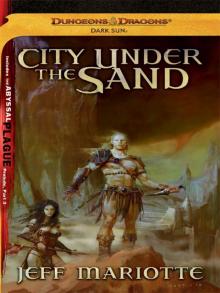 City Under the Sand: A Dark Sun Novel (Dungeons & Dragons: Dark Sun)
City Under the Sand: A Dark Sun Novel (Dungeons & Dragons: Dark Sun)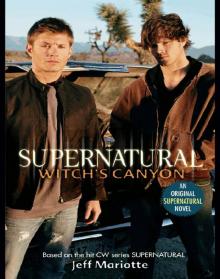 Witch's Canyon
Witch's Canyon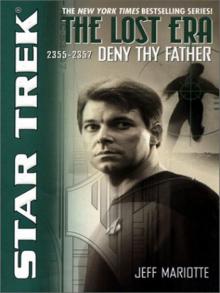 STAR TREK: The Lost Era - 2355-2357 - Deny Thy Father
STAR TREK: The Lost Era - 2355-2357 - Deny Thy Father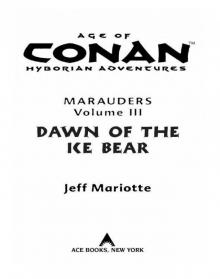 Dawn of the Ice Bear
Dawn of the Ice Bear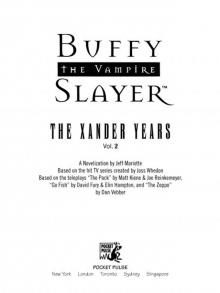 The Xander Years, Vol.2
The Xander Years, Vol.2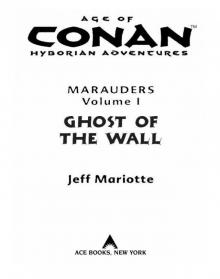 Ghost of the Wall
Ghost of the Wall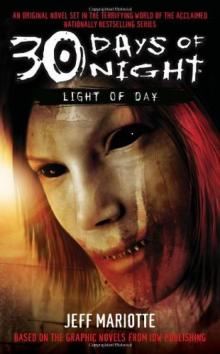 30 Days of Night: Light of Day
30 Days of Night: Light of Day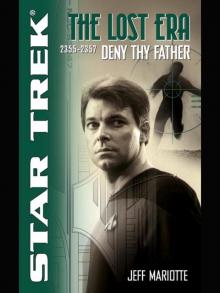 Deny Thy Father
Deny Thy Father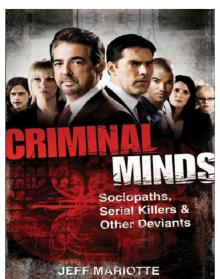 Criminal Minds
Criminal Minds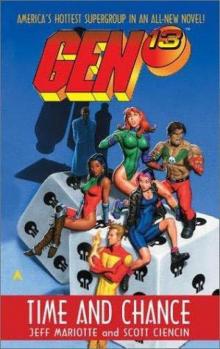 Time and Chance
Time and Chance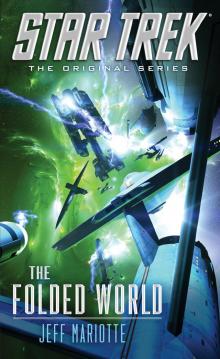 The Folded World
The Folded World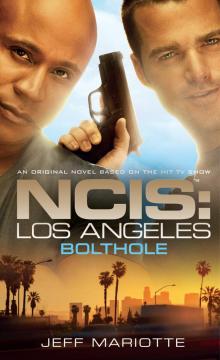 Bolthole
Bolthole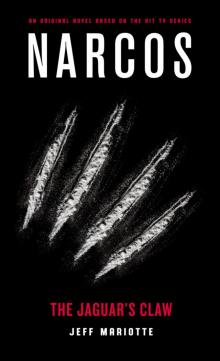 Narcos
Narcos Right to Die
Right to Die